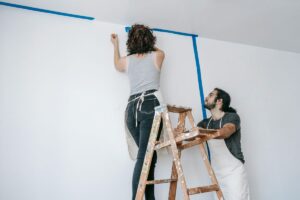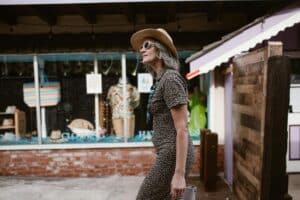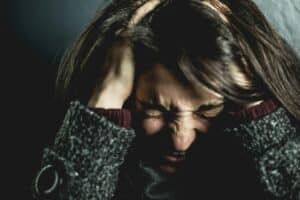Making your own bubble solution is a fun, easy, and cheap way to keep your kids entertained.
My son loves playing with bubbles and I do as well. This is an outdoor activity that we enjoy almost any time of the year.
Many years ago, I worked as the arts and crafts director at a local Girl Scout Camp.
I would make two gallons of bubble solution to have ready as an activity to do after tie-dying. Not only it’s fun, but the soap serves the double duty of getting the dye off of the girls’ hands.
Many years ago, I was given a receipe which I use to this day and have etched to my memory!
Now that I am a parent, I have tried making that same recipe a couple of times but haven’t been able to get the same large, stretchy bubbles that we got years earlier.
Homemade Bubble Recipes
I decided to try as many bubble recipes as possible before finding one that works both at home in Texas and at Grandparents’ house in the San Francisco Bay Area.
In this post (part 1), I will share the recipes that we tried and the results while playing in our backyard in Texas. I’ll share the results from Grandma and Grandpa’s house in another post.
How to Get Set Up
To keep the experiment consistent, I used filtered water for all the recipes. The water in parts of Texas is pretty hard, so I am sure that would make a difference.
For the dish-washing soap, I used the blue bottle of regular scented Dawn, the one they use to wash birds during an oil spill.
We played on a relatively clear and warm day in May that only had a little breeze, and the humidity was at about 27%.
#1 – The Recipe I Learned Years Ago and Used at Camp:
- 1 gallon of water
- 1 cup of dish-washing soap
- 2 tablespoons of liquid glycerin (can be found in drug stores)
Gently mix the ingredients together by hand and let the solution sit overnight, uncovered. The “sitting overnight” part is really important.
Results in Texas:
These weren’t great.
The solution did produce some bubbles, but they often popped very quickly. They rarely got a chance to float away from the wand where a toddler would want to chase after them.
I’m curious that they might work better if I cut back the water a bit.
But I honestly don’t think I’ll make this one again. I wonder if they were just as bad when I made them at Girl Scout Camp, and my memory has just exaggerated how fun they were to play with.
#2 – A Recipe They Used on Sesame Street Episode #4259 “The Bubble Fest”:
- 1 1/2 quarts of water
- 1 cup dish-washing soap
- 1/2 cup light corn syrup
Gently mix together by hand, but don’t mix so vigorously that you produce foam.
Results in Texas:
This one did better than I expected. It produced a decent amount of bubbles, and they stuck around long enough to actually float away. I’m curious if I increase the amount of water a little bit, if I will get better results.
The ratio of water to soap in this recipe is a lot of soap for just one and a half quarts of water. If I were filling small bottles of bubble solution for a birthday party, though, this is the recipe I would use.
#3 – Recipe I Borrowed From the Book: “How to Make Monstrous, Huge, Unbelievably Big Bubbles” by David Stein:
- 12 cups of water
- 1 cup of dish-washing soap (the book recommended original Ivory, blue Dawn or yellow Joy)
- 1 cup cornstarch
- 2 tablespoons of baking powder
Gently mix the solution together and let it sit, uncovered, for one hour. Stir occasionally to help dissolve the cornstarch.
Results in Texas:
The author of the book that I borrowed this recipe from claims it produces really large bubbles – the kind you can make with a hula hoop.
The book also states that relative humidity plays a large role; higher humidity helps to make larger bubbles that last longer. Perhaps in Texas, there just wasn’t enough humidity in the air.
Not all of the cornstarch dissolved in the solution despite stirring it like I was told, so there was a gloppy layer of goo at the bottom of my bowl.
The bubbles were just as disappointing as they were in Recipe #1. Very few survived long enough to fly beyond the bubble wand, and the few that did popped very quickly.
#4 – Another Version of Recipe #3:
- 12 cups of water
- 1 cup of dish-washing soap
- 1 cup cornstarch
- 2 tablespoons of baking powder
- one 2.5 to 3oz tube of personal lubricant (like KY Jelly)
- 1 cup of very warm water
Gently mix the first four ingredients together and let it sit, uncovered, for one hour. Stir occasionally to help dissolve the cornstarch.
Mix the personal lubricant and the warm water in a separate cup. Once the lubricant has dissolved, add it to the bubble mix.
This last added step is supposed to help the bubbles have better staying-power and be stretchier.
Results in Texas:
Of the four recipes, this one worked the best. The personal lubricant must have really done the trick! Like Recipe #3, I still had a layer of cornstarch at the bottom of the bowl, but it was totally worth it.
The bubbles produced were stretchy and fun to chase after. I really want to buy a kiddie pool and a hula hoop so we can try making some giant bubbles!
Conclusions:
The winner of our Texas bubble recipe experiment goes to – Recipe #4.
With the odd ingredient in this recipe, it produced some really stretchy bubbles. My husband thought I must have looked a little crazy at the store when I bought these ingredients all at the same time.
So far, none of the recipes have produced as many bubbles as the store-bought solutions, though.
When I look at the store-bought ones, they are much thicker than any of the recipes above, so I’m curious what ingredients they are using to get such stretchy, long-lasting bubbles. I’m pretty sure it’s a trade secret, though.
Stay tuned for the results of these same recipes made at Grandma and Grandpa’s house in the San Francisco Bay Area. The humidity is higher there, so I’m hoping we will get better results.
More Articles From Mama Say What?!
- Your Taste of Heaven: Salted Caramel Pretzel Bark
- The Best Homemade Bubble Recipes (Part 1)
- The Best Would You Rather Questions to Liven Up Your Next Party
- Here’s a Great Idea for a DIY Smart Phone Holder to Use in Your Car
Featured image credit: Shutterstock
Tim Thomas is a renowned writer and entrepreneur specializing in finance, investing, and money matters. With his extensive knowledge and experience in the financial sector, Tim offers valuable insights into the world of personal finance, stock market trends, and investment strategies.





